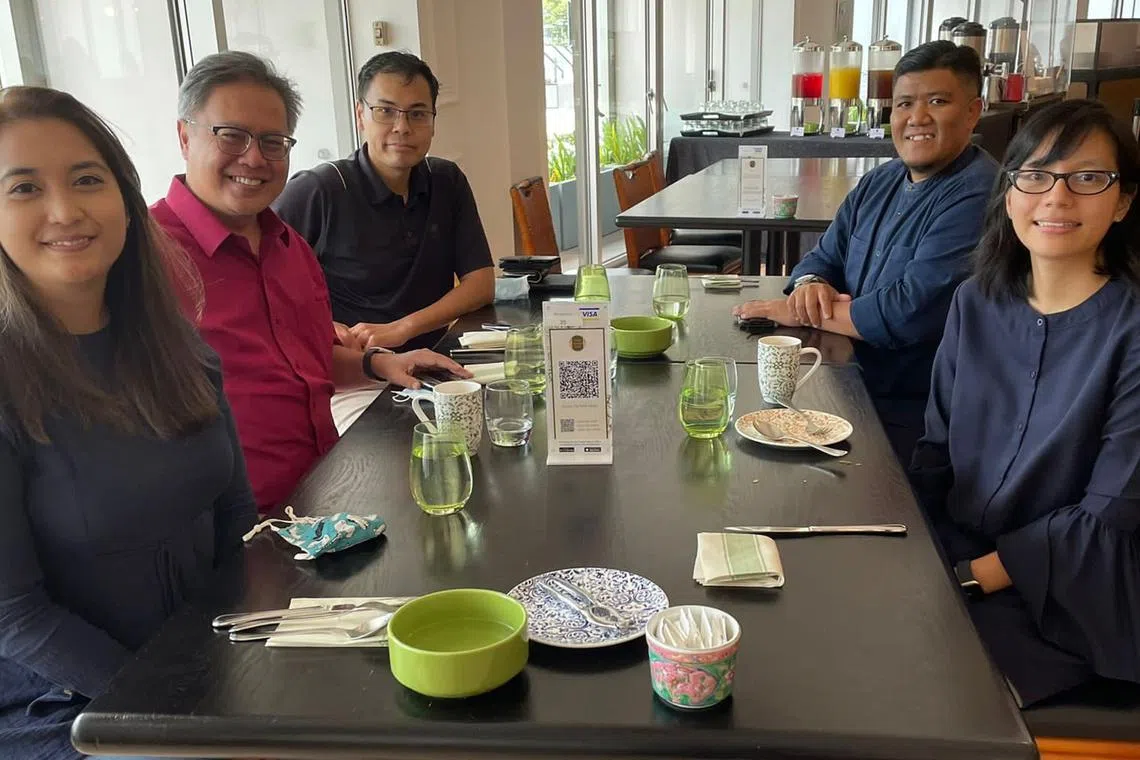Landmark book on Muslim family law launched
Sign up now: Get insights on Asia's fast-moving developments

Co-authors of Muslim Family Law In Singapore Maryam Hasanah Rozlan (left), Ahmad Nizam Abbas (second from left) and Istyana Putri Ibrahim (right). With them are Mr Mohamed Faizal (third from left) from the Attorney-General’s Chambers and Mr Irwan Hadi from Muis, who both proofread and gave input to the book.
PHOTO: SINGAPORE ACADEMY OF LAW
SINGAPORE - When veteran lawyer Ahmad Nizam Abbas and two others completed a book on Muslim family law, he hoped to dispel the misconception that legal practice in the Syariah Court is the exclusive domain of Muslim lawyers.
The Syariah Court settles disputes and related matters in relation to divorcing parties under the Administration of Muslim Law Act. All such parties are either Muslims or married under Muslim law. The court also may issue inheritance certificates to facilitate estate distribution under Muslim law.
“(Unlike elsewhere), the lawyer in Singapore can be of any religion. What matters is the knowledge and the capacity to represent clients in the Syariah Court,” said Mr Ahmad in a recent interview with the Singapore Academy of Law (SAL). The 55-year-old runs his own law firm, Crescent Law.
The book – Muslim Family Law In Singapore – is the first targeted textbook on the practice of Muslim family law here, and is co-written with Ms Istyana Putri Ibrahim from the Legal Aid Bureau and Ms Maryam Hasanah Rozlan from Kaplan Singapore.
Launching the book on Oct 18, Justice Valerie Thean noted that there “has been no equivalent textbook touching on this area of practice in Singapore since Ahmad Ibrahim’s textbook on Islamic Law in Malaya in 1965”, referring to Singapore’s first attorney-general, who was also a prolific legal expert and law professor.
“Now, we have a useful and practical guide to the many questions we have on substantive Muslim family law and procedure.”
She added: “Reading the draft the authors sent me, I wish I had had the benefit of the last chapter when I dealt with an inheritance case just two months ago. I congratulate our authors and SAL on its publication.”
Published by SAL’s Academy Publishing, the 664-page book provides a comprehensive survey of topics, analyses reported cases and relevant developments, and carries insights as well as commentary on various issues.
One case concerns a woman based in India who made a deed of gift (hibah) of her Housing Board flat to her daughter in 2011.
The daughter argued that the unit was a gift and did not form part of her late mother’s estate, relying on a fatwa (Islamic ruling) she obtained from the Islamic Religious Council of Singapore (Muis) in December 2016 that the hibah was valid under Muslim law.
The son objected when the case went to court, pointing out that the HDB’s consent was not obtained for the transfer, as required under the Housing and Development Act.
Justice Choo Han Teck held that the Act made it clear that no HDB flat shall be disposed of without the prior written consent of the board. As consent was not sought, the transfer was void.
The judge added that Muis’ fatwa considered the validity of the hibah only in accordance with Muslim law governing formal requirements.
The authors noted that the case is the only reported decision so far on a hibah ruqba, which is a unique instrument under Muslim law.
“Upon reading this textbook, the reader will appreciate the great strides that have been made in the administration of Muslim family law in general,” wrote Syariah Court senior president Guy Ghazali.
She added that she had long awaited such a comprehensive textbook, like other practitioners.
Priced at $96.30, the book is available from SAL.



